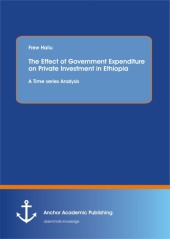 Neuerscheinungen 2015Stand: 2020-02-01 |
Schnellsuche
ISBN/Stichwort/Autor
|
Herderstraße 10
10625 Berlin
Tel.: 030 315 714 16
Fax 030 315 714 14
info@buchspektrum.de |

Frew Hailu
The Effect of Government Expenditure on Private Investment in Ethiopia:A Time series Analysis
Erstauflage. 2015. 112 S. 11 Abb. 220 mm
Verlag/Jahr: ANCHOR ACADEMIC PUBLISHING 2015
ISBN: 3-9548935-4-1 (3954893541)
Neue ISBN: 978-3-9548935-4-6 (9783954893546)
Preis und Lieferzeit: Bitte klicken
Text Sample:
CHAPTER ONE: INTRODUCTION
Chapter 1.1. Back ground of the Study:
The interest of economists in the relationship between government spending and private investment is motivated mainly by the controversy over the crowding out or crowding in effect of government spending on private investment. With the renewed interest in the role of the private sector as an engine of economic growth, the examination of this relationship is given further impetus. The idea of a private sector led economic growth in Ethiopia is therefore traceable to the observed success of the major industrialized countries; which attributed to the resilience of their organized private sector (Nasir & Muhammad, 2009).
As a result of the poor performance of the economy over the period in which government played the leading role in the economy, there was a change in the expected role of the government. To this end, market oriented structural reform programs such as privatization and deregulation were adopted to ensure a reduction in the role of government in the economy. The guiding principle in this redefined role of government was that government should concentrate its resources in areas that compliments rather than crowd-out private sector investment, thereby creating an enabling environment for the private sector investment (Nasir & Muhammad, 2009).
Some economists have argued that increase in government spending can be an effective tool to stimulate aggregate demand for a stagnant economy and to bring about crowed-in effects on private sector. According to Keynesian view, government could reverse economic downturns by borrowing money from the private sector and then returning the money to the private sector through various spending programs. High levels of government consumption are likely to increase employment, profitability and investment via multiplier effects on aggregate demand. Thus, government expenditure, even a recurrent nature, can contribute particularly to private investment and economic growth. On the other hand, endogenous growth models like Barro predict that only those productive government expenditures will positively affect the long run growth rate (Barro, 1990).
In the neoclassical growth model of Solow productive government expenditure may affect the incentive to invest in human or physical capital, but in the long-run this affects only the equilibrium factor ratios, not the growth rate, although in general there will be transitional growth effects. Others have argued that increase in government expenditures may not have its intended salutary effect in developing countries, given their high and often unstable levels of public debt. Thus government consumption crowds out private investment, dampens economic stimulus in short run and reduces capital accumulation in the long run (Solow, 1956).
Further Vedder and Gallaway argued that as government expenditures grow incessantly, the law of diminishing returns begins operating and beyond some point further increase in government expenditures contributes to economic decline and stagnation (Gallaway & Vedder, 1998).
The Ethiopian economy is a mixed system in which the government and the private sector co-exist. The two could play complimentary roles to enhance economic growth. Thus, it is in line with this that the use of government expenditure to enhance private investment is being advocated.
To address the inefficiencies in public expenditure management in Ethiopia, the federal government introduced wide range of policies and institutional reforms, geared towards privatizing the economy, particularly since 1992 when the structural adjustment program (SAP) was implemented. The Transitional Government of Ethiopia, which was established after the downfall of the military regime in May 1991, initiated a new market-driven economic policy followed by a comprehensive structural and economic reform program. One of the major objectives of the reform program was to rectify the fiscal


